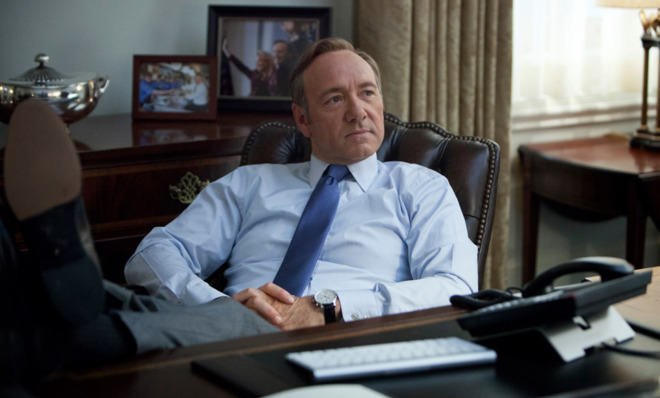It's time for Netflix to stop acting like television
To be truly revolutionary, the streaming service should embrace its unique potential: storytelling without boundaries


A free daily email with the biggest news stories of the day – and the best features from TheWeek.com
You are now subscribed
Your newsletter sign-up was successful
At 3:00 a.m. EST tonight, House of Cards fans can start watching the Netflix drama's second season. And while the streaming service has been relatively tight-lipped about this phase of the show, all those viewers can go in expecting the same thing: A second season that's virtually identical to the first in both structure and form.
Much has been written about how Netflix has revolutionized television by releasing entire seasons of shows like House of Cards at once — an act that encourages binge-watching. But like the vast majority of cable dramas (and an increasing number of network dramas), House of Cards' second season will consist of 13 episodes, each of which will be somewhere between 45 and 60 minutes long. In other words, on an episode-by-episode level, it — like all of Netflix's series — will be exactly like conventional television.
In a recent interview at The Atlantic, House of Cards showrunner Beau Willimon addressed the show's relatively conventional structure, and how he thinks it might change in the future:
The Week
Escape your echo chamber. Get the facts behind the news, plus analysis from multiple perspectives.

Sign up for The Week's Free Newsletters
From our morning news briefing to a weekly Good News Newsletter, get the best of The Week delivered directly to your inbox.
From our morning news briefing to a weekly Good News Newsletter, get the best of The Week delivered directly to your inbox.
"I don’t know how much longer the idea of a 'season' will be something that we feel like we need to adhere to in television. Even the idea of an episode. I think with streaming, you might have shows in the future where you have three or four hours released. And then three months later you’ll get another couple hours. And then nine months later you might get six more hours. […] I’ve toyed with the idea for a show that doesn’t have episodes at all. That would simply be one eight-hour stream for a season, and the viewer decides when they want to pause, if at all." [The Atlantic]
For now, Willimon explains, there's a practical reason House of Cards hasn't attempted any of those daring structural gambits: The series makes too much of its money from international markets, where it airs as a more conventional drama (complete with commercial breaks). And business aside, there's a reason storytellers tend to fall back on three-act structures: They're a convenient and dramatically satisfying way to tell a story, as fans of virtually any successful TV show can attest.
But Willimon's interview also hints at the utterly untapped creative potential that Netflix offers. For decades, TV creators have been tied to a business structure that requires uniformity. An episode needs to be the precise length to fit into the same time slot every week. An episode's story need to be structured in a way that allows for commercials (and gives audiences enough motivation to sit through them). Even the most daring shows adhere to this basic, formal structure: Take HBO's Game of Thrones, which has invariably delivered its most climactic punch in the penultimate episode of each season, or Breaking Bad, which propelled viewers along by ending episodes on cliffhangers.
In recent years, we've seen shows like American Horror Story and True Detective play with the structure of television on a season-by-season basis. But despite these breaks from convention, there's only so much a creative team can do with a TV show that needs to fill a certain number of minutes for a certain number of episodes.
Netflix has none of those barriers. Someone could create a show where one episode is 75 minutes long, and the next episode is 15 minutes long. Someone could decide to release one episode every week, or every month, or every holiday — or at random, turning every new installment into a welcome surprise. Someone could release every episode of a series but the finale, then hold that finale back for six months — turning its premiere into a buzzy event that will be simultaneously shared by all of its viewers.
A free daily email with the biggest news stories of the day – and the best features from TheWeek.com
The structure of television is so deeply ingrained that it takes effort to even imagine these kinds of scenarios — but anyone who's willing to break with convention has the opportunity to expand the very definition of TV storytelling. Netflix has thrived, in part, by embracing what separates its service from conventional television. If they keep pushing those boundaries — in a way that their conventional rivals never could — who knows what kinds of stories could emerge?
Scott Meslow is the entertainment editor for TheWeek.com. He has written about film and television at publications including The Atlantic, POLITICO Magazine, and Vulture.
-
 The Olympic timekeepers keeping the Games on track
The Olympic timekeepers keeping the Games on trackUnder the Radar Swiss watchmaking giant Omega has been at the finish line of every Olympic Games for nearly 100 years
-
 Will increasing tensions with Iran boil over into war?
Will increasing tensions with Iran boil over into war?Today’s Big Question President Donald Trump has recently been threatening the country
-
 Corruption: The spy sheikh and the president
Corruption: The spy sheikh and the presidentFeature Trump is at the center of another scandal
